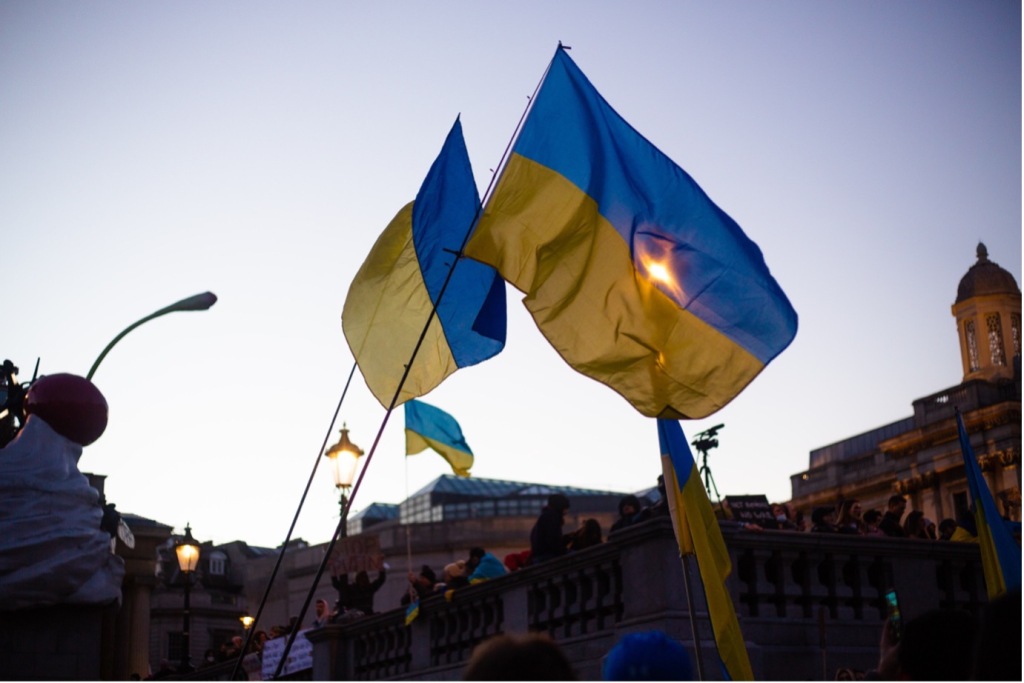Author: Katie McCann
In his speech on the 24th of February 2022, Vladimir Putin explicitly used the West’s own model of liberal war to justify his baseless invasion of a sovereign nation, claiming that a ‘genocide of the millions of people’ who live in the Donbas region of Ukraine is the responsibility of Russia to halt. Putin simultaneously derided the US’s own forays into ‘liberal war’, calling out the invasion of Iraq, alongside interventions in Libya and Syria as catastrophic, arguing that ‘nearly everywhere, in many regions of the world where the United States brought its law and order, this created bloody, non-healing wounds and the curse of international terrorism and extremism’.
How can we understand the current crisis of Ukraine within the context of liberal wars, i.e., wars conducted in pursuit of a humanitarian agenda that seeks to remodel the state? And why is the notion of liberal war a profoundly unstable one on which to lay an unwarranted military invasion, whether instigated by so-called liberal or illiberal states?

Indeed, with the withdrawal of Western troops from Afghanistan in 2021, and US President Joe Biden’s assertion of the end of ‘an era of major military operations to remake other countries’, it is clear that the concept of liberal wars remains highly salient in global governance. Biden declared the attempt to enforce liberal values of democracy and unification in Afghanistan a failure. And indeed, that’s what it was. Both the US in Afghanistan and Russia in the Ukraine have invoked the concept of liberal wars, a concept that does not and cannot exist. Rather, I argue that these conflicts must be seen as false flags for the imperial ambitions of large states.
Liberal Wars: A Contradiction in Terms
What are the conceptual logics of liberal war? First, liberal war demands an intention (or at least purported intention) that the conflict is grounded upon a humanitarian basis. Putin has affirmed this through his unsubstantiated claims of a genocide of native Russian speakers at the hands of Ukraine. Putin seeks to protect Russian-speaking Ukrainians who are subject to persecution, forming the primary humanitarian basis for justifying Russian invasion. Here, language-identity is constructed as a marker of the Russian sphere of influence which guarantees Russia the right to dominate on the basis of protecting ethnic Russians. On this basis, the invasion is marketed as in defence of civilian lives, and might be compared with the case of Afghanistan, where the plight of women was emphasised repeatedly.
Second, the aim of liberal war is neoliberal reform and reconstruction. Moscow’s desire to reclaim Ukraine as part of its historical land and reform the country in its own model mirrors the same spirit as the US in Afghanistan, made clear through Biden’s objection that such reform proved impossible.
Importantly, the very term ‘liberal war’ is itself illogical. Warfare is necessarily illiberal; the individual is not privileged over the collective, war infringes upon the right to life, and war threatens liberal values like the right to property, ownership, and freedom from harm. This is an issue that primarily concerns the West’s justification of this type of warfare. If these are not the liberal values the west claims to uphold, then what are? Advancements in warfare technology suggest that wars are becoming increasingly humane, and presumably more capable of upholding liberal values. Yet this is a false assumption. Attempts to reorder societies into liberal models are immensely violent. Disengagement with warfare on the part of the intervening power simply detaches large powers from the consequences of military action. Wars of this nature fundamentally cannot be liberal as they do not preserve essential liberal values in practice, even if they are engaged toward a liberalising basis.
Even illiberal states that emphasise a humanitarian agenda in conflict fall into a similar conceptual trap. Russia has shown no sign that it is seeking to use restraint in its attempt to reclaim its supposed land and people, despite its insistence that this ‘special military operation’ is about protecting the lives of the same Russian-speaking people who are ferociously resisting the invasion. Even if Russia were truly interested in protecting the lives it claims are its own, the kind of warfare they have engaged ensures this is not possible. From blocking humanitarian corridors to bombing orphanages, children’s cancer hospital, and schools, Moscow has trampled on the right to life, property, and basic freedoms it claims to be defending. In Putin’s words, ‘Freedom guides our policy, the freedom to choose independently our future and the future of our children. We believe that all the peoples living in today’s Ukraine, anyone who want to do this, must be able to enjoy this right to make a free choice’. Given the events of the past weeks, these words could not ring more hollow. While Russia claims a humanitarian narrative in its invasion of Ukraine, its actions have been anything but.
An Unlevel Playing Field
Who decides which wars are humanitarian, and which are illegitimate? The answer is invariably those states who wage war and institutions of the international world order with enough political power or military capital to make these decisions. Liberal wars exist within a hierarchical order in which the intervener exerts a power unavailable to the subject population.
We increasingly see in Ukraine that Russian-speaking people—who have historically been considered the most pro-Russian in the country—have rejected Russia’s ‘defensive’ mission. This shift in opinion is propelled by the sentiment: ‘how can you be pro-Russian if your country is being bombed and destroyed? … [we, Russian-speaking Ukrainians] now feel support for Ukraine because we are in hell’. The saviour narrative that Russia is creating mirrors the liberal ethos. Putin states that he seeks to free people from oppression and put them on a path to freedom from tyranny. This echoes American assertations that it set out to free the Afghan people from the oppression of the Taliban. Clearly, the faux liberalising mission is one that can be weaponised by any power, and is now being wielded once again, this time in Ukraine.

Can Humanitarianism be a Genuine Basis for Intervention?
It would be wrong to assume that all humanitarian interventions insincere, and conflating humanitarian intervention with liberal wars can result in severe harms. For one, states might become unwilling to engage on a humanitarian basis, limiting the actors involved in a crisis to a handful of states. It also makes humanitarian interventions prohibitively expensive by encompassing it as part of a broader programme of whole state reform.
Putin’s invocation of Ukrainian fascism and genocide to justify his invasion suppresses the seriousness of such crimes. Humanitarian crises, especially those perpetrated by the state against the people, can require the intervention of the international community. Moscow’s cynical use of humanitarianism will only hurt those in the future who may need international support.
In sum, liberal wars cannot truly exist, despite Putin’s attempts at using the concept for his own ends. The Russian invasion is based on an interest in saving a people that have shown no indication they want to be saved. The justification for liberal war and humanitarian intervention rests within the purview of the states with the greatest power and leverage in the international system, while the subject populations—as shown in Ukraine—have had no real consultation on the matter. This has real ramifications for the pursuit of genuine humanitarian involvement.
Liberal wars represent a muddled compilation of imperial interests and shadowy motivations that do little to protect the people it supposedly seeks to help. The people of Ukraine are facing the threat of long-term Russian involvement in the remodelling of their state based on a false humanitarian logic. The development of liberal interventions threatens to open the floodgates for even more baseless incursions into sovereign territory in defence of a people who never asked for protection.
About the Author: Katie McCann is an MA International Conflict Studies student at King’s College London.
References:
Coker, C (2001) Humane Warfare: The New Ethics of Postmodern War.
Falk, R (2005) ‘Legality and Legitimacy: The Quest for Principled Flexibility and Restraint’, Review of International Studies, Vol 31.
Freedman, L (2004) ‘The Age of Liberal Wars’, Review of International Studies, Vol 31.
Jabri, V (2012) The Postcolonial Subject: Claiming Politics/Governing Others in Late Modernity.
Jabri, V (2007) War and the Transformation of Global Politics.
Peak, T (2021) ‘Rescuing Humanitarian Intervention from Liberal Hegemony’, Global Responsibility to Protect, Vol 13(1).
